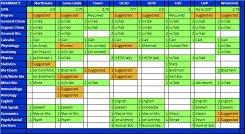Today's Black Friday, and what did I buy? (Ignoring the speakers and a dvd player/burner for my computer. Both of which I'm using as I type this. =D)
Despite the title of this post, the first item isn't a book. It's the CPR Pocket Resuscitator. I took the class and got certified, and I thought these things were cool when we were practicing with them. I looked'em up on Amazon.com and saw they were only about $10! Click. It was an auto-buy.
I took the class because I want to be prepared, just in case. I bought this little guy to help me be prepared for that just in case. Although I have yet to decide where I'm going to keep it. I have an emergency bag where I keep a first aid kit, an ace bandage, etc that I might throw it in. Although I was also thinking the glove compartment of my car. But then of course just keeping it in my bag might be a good idea too. I want to have it handy when there's an emergency... so I need to have it with me when I'm around an emergency. But since it's only $10, I may just buy a couple more.
The orange case comes inside a ziplock bag, and inside is the resuscitator, some blue nitrile gloves (size: large), some antiseptic handwipes, and some brief instructions. Definitely worth it.
Get Into Pharmacy School: Rx for Success! Now it should be obvious why I bought this. I'm working towards and writing about getting into pharmacy school, and that's what this book is about. I'll do a full review on it when I'm done getting through it.
As for a glimpse into what's in it, the Table of Contents is divided into six sections:
PART ONE: Is Pharmacy School for You?
- Ch 1: Introduction to Pharmacy
- Ch 2: Making the Decision
PART TWO: Planning for Pharmacy School
- Ch 3: Planning Your Undergraduate Experience
- Ch 4: The Pharmacy College Admission Test (PCAT)
- Ch 5: Selecting the Right Program
- Ch 6: Researching Pharmacy Schools
PART THREE: Applying to Pharmacy School - Navigating the Application Process
- Ch 7: Admission Criteria
- Ch 8: Completing the Application
- Ch 9: Personal Statement
- Ch 10: Letters of Recommendation
- Ch 11: The Interview
- Ch 12: Admissions Process - An Inside Perspective
- Ch 13: Rejection and Your Alternatives
PART FOUR: Preparing for Your Career in Pharmacy
- Ch 14: What to Expect and Do in Pharmacy School
- Ch 15: Postprofessional (Post-Pharm.D.) - Residencies, Fellowships, and Board Certifications
- Ch 16: Career Options
PART FIVE: Financing Your Degree
- Ch 17: Figuring Out Costs
- Ch 18: Applying for Financial Aid
- Ch 19: Finding Free Money
- Ch 20: Borrowing the Money
PART SIX: Resources
- Quick Reference List of Key Resources
- Pharmacy School Statistics
- Index
Looks like there should be a lot of good information in there, and this is a first printing, published in 2009, so the info should be up to date. I'll let you know how it goes!
Prescription to My Younger Self: What I learned after Pharmacy School Now this book... it caught my eye as I was shopping for the other one. It was first published on March 28, 2008... had no description and no reviews. Yet it had a very catchy title and there were only two copies left! (Just one copy now with a "order soon (more on the way)" note on it.). It was only $20, and I was curious.
I've only just cracked it open since it only arrived today, but here's an actual description for anyone else wanting to take a look at it, straight from the book:
This book is a collection of letters written by pharmacists in varying professional settings, who we feel have either excelled in the profession of pharmacy, or who have inspired us and were willing to share their stories in print. We asked the pharmacists to provide a biography along with a letter they have written int he present to their former self on the day that they graduated from pharmacy school, and share the pearls of wisdom they learned about their profession after graduation. Included in the epilog is group of letters from a different perspective- the student. Each of us contributed a letter reflecting upon our current aspirations and hesitations as we venture into the unknown, a career. Prescription to My Younger Self: What I learned after Pharmacy School, allowed us to step outside of the box and take a chance on a very unique and rewarding project.
There are twenty-seven total pharmacist chapters, from pharmacists in all kinds of pharmacy settings, as well a chapter each from the four students who came up with the idea for this book. So the title of the book didn't lie to me, and it is what it says. Cool. And now you guys get more info about it than amazon.com gives. Full review forthcoming!







